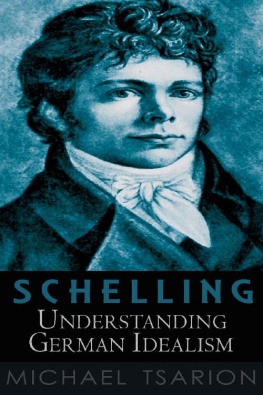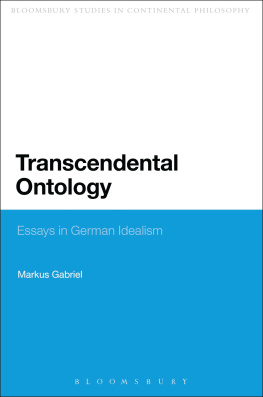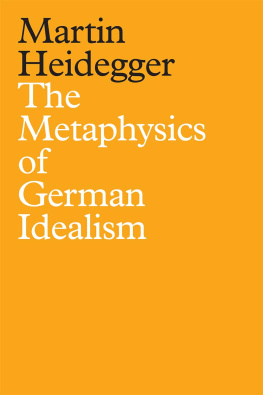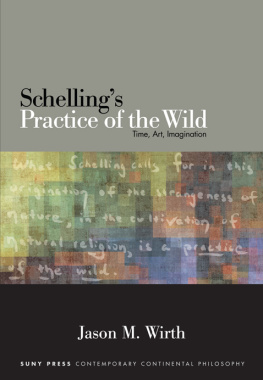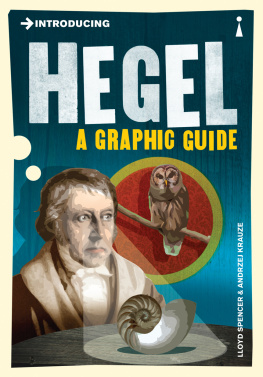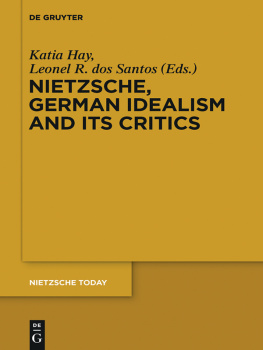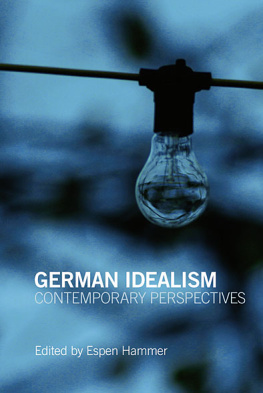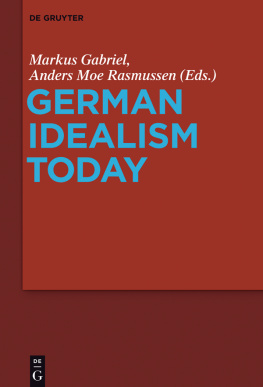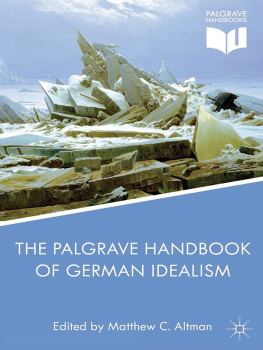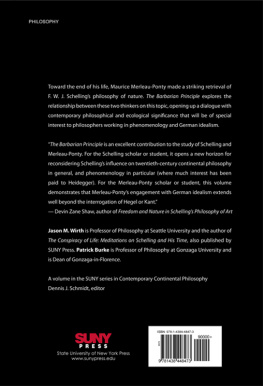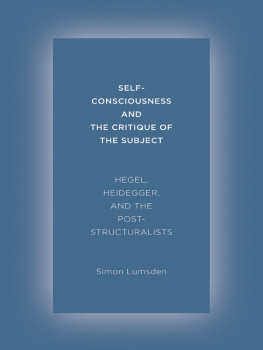Michael Tsarion - Schelling: Understanding German Idealism
Here you can read online Michael Tsarion - Schelling: Understanding German Idealism full text of the book (entire story) in english for free. Download pdf and epub, get meaning, cover and reviews about this ebook. year: 2016, publisher: Unslaved Media, genre: Science. Description of the work, (preface) as well as reviews are available. Best literature library LitArk.com created for fans of good reading and offers a wide selection of genres:
Romance novel
Science fiction
Adventure
Detective
Science
History
Home and family
Prose
Art
Politics
Computer
Non-fiction
Religion
Business
Children
Humor
Choose a favorite category and find really read worthwhile books. Enjoy immersion in the world of imagination, feel the emotions of the characters or learn something new for yourself, make an fascinating discovery.
- Book:Schelling: Understanding German Idealism
- Author:
- Publisher:Unslaved Media
- Genre:
- Year:2016
- Rating:3 / 5
- Favourites:Add to favourites
- Your mark:
- 60
- 1
- 2
- 3
- 4
- 5
Schelling: Understanding German Idealism: summary, description and annotation
We offer to read an annotation, description, summary or preface (depends on what the author of the book "Schelling: Understanding German Idealism" wrote himself). If you haven't found the necessary information about the book — write in the comments, we will try to find it.
Schelling: Understanding German Idealism — read online for free the complete book (whole text) full work
Below is the text of the book, divided by pages. System saving the place of the last page read, allows you to conveniently read the book "Schelling: Understanding German Idealism" online for free, without having to search again every time where you left off. Put a bookmark, and you can go to the page where you finished reading at any time.
Font size:
Interval:
Bookmark:
Understanding German Idealism
by
Michael Tsarion
Copyright 2016 Unslaved Media. All RightsReserved.
No part of this publication may be reproduced,stored in a retrieval system or transmitted in any mechanical,photocopying, recording or otherwise, without the publisher'spermission.
First Kindle Edition, July 2016
I first began studying academic philosophy at a community college inBelfast in 1987. Although I did not take the classes to matriculate,my interest in Western philosophy, which had always been sincere, wasenhanced considerably. We were fortunate to have a captivating tutor,a very rare thing in Northern Ireland in those days. Unlike ordinaryschool we were permitted to wear our own clothes rather than uniformsand even allowed to go about the college smoking. It was a barelybearable experience, but mission accomplished I activated mylittle grey cells and learned many interesting things.
After taking the same class the following year, 1988, I left Belfastand moved back to the Bay Area California. Working deadbeat jobs Icontinued studying philosophy on my own, albeit on the quiet. It wasnot until 1993, when I first came across Being and Time byMartin Heidegger, that I experienced a major turning point in myintellectual life. Before that I had been upgrading my insight intothe nature of our crazy world by devouring the works of Ayn Rand, andwithout doubt I am a committed Randian. Reading widely from numerousfields I became familiar with the work of Henri Bergson and was deeplyinspired by the poetry of Rainer Maria Rilke. Finding out how muchHeidegger was influenced by Rilke and other existentialist poetsencouraged me to continue finding out more about the philosopher'sideas. Twenty years later I felt I had a grasp of what Heidegger andRilke were thinking. Of course to study Heidegger means to study thewhole of Western philosophy, and in so doing I was eventually able topenetrate more deeply into Hegel, Schelling and the German Idealists.Understanding Heidegger inevitably means asking what he found soflawed and reprehensible about other traditions. What was hecritiquing in Scholasticism, Cartesianism, Rationalism, Metaphysics,Epistemology and Idealism? One is compelled and condemned to dart offin so many directions in order to make sense of his uniqueperspectives. Nevertheless it was well worth the twenty three years ofcommitted effort.
Eventually I learned that Heidegger had a soft spot for the relativelyunknown German Idealist Friedrich Schelling. This is not surprisinggiven that some of Heidegger's key ideas on the nature of Being comedirectly from Schelling's work entitled First Outline on aSystem of Nature. Few know that in 1936 at the University ofFreiburg, Heidedgger gave a scintillating series of lectures on hisGerman predecessor. These courses and his book Schelling'sTreatise: On the Essence of Human Freedom, are responsible forawakening some interest in the lesser known genius.
I also came to Schelling through a study of Hegel. Personally Ienjoy contemplating the ideas of both men, and it was intriguing todiscover their debt to German mystics of bygone ages, such as JacobBohme, Meister Eckhart and Nicholas Cusanus. Having studied the writingsof William Blake since I was five years old, I was more than eager toread anything that helped explicate the great English mystic. It isknown that Blake read Bohme and was influenced by the sage's enigmaticideas. I felt sure that Blake, for all his originality and iconoclasm,would have been in agreement with many perspectives of Schelling andHegel.
More recently I find it odd and contemptible that Schelling's name ishabitually omitted by the fledgling scientific cadre of "ReligiousNaturalists" or "Naturalistic Pantheists," as they tend to callthemselves. I support their work, and am myself a Mystical Naturalist.I certainly believe that Religious Naturalism will eventually emergeas a major paradigm and school in science, particularly after thedominant materialist-physicalist approaches crash to the ground undertheir own weight, as they are now doing. The growing interest in thedynamic discoveries of Hannes Alfven, David Bohm, Richard Tarnas,Arthur Koestler, Ken Wilber, Michael Talbot, Bruce Lipton, StuartHameroff, Rupert Sheldrake, Iain McGilchrist, and the ReligiousNaturalists, is bound to influence up and coming young scientists,encouraging them to reject materialism and be receptive to newparadigms about spirituality, cosmos, existence, identity, will,freedom, nature, culture and morality. However, as said, the championsand exponents of sensible science must be reminded toacknowledge their great intellectual predecessors, and recognize thatnone of their own ideas are new. Blake, Goethe, Steiner, Berkeley,Hegel, Schelling and Whitehead must be correctly and respectfullyhonored as we move forward to bring forth a saner and more holisticunderstanding of reality.
My chagrin at the unbearable omissions in recent books byReligious Naturalists spurred me to correct the egregious problem bywriting this book. It is intended as an introduction to Schelling andGerman Idealism, but also honors the work of Bohme, Blake, Berkeley,Rank, Reich, Whitehead, Heidegger, Merleau-Ponty, and other savants ofthe past with profound ideas that must never be neglected,misinterpreted or repackaged by crafty newbies jostling for personalintellectual acclaim.
Schelling is perhaps the least remembered and read major Westernphilosopher. I therefore hope my book encourages readers to delve intohis works with interest and respect. In accord with their intellectual,mystical and romantic predecessors, Schelling and Hegel offer the mostcoherent proofs for the existence of Spirit. They were not men ofbelief but of direct Knowledge, and the world's sincere seekersof Truth must return to imbibe their wisdom, heedless of the cacophonyof corrupt disingenuous voices from all sides which attempt tobelittle and dismiss their elegant and profound philosophies.
TRUTH AGAINST THE WORLD
The man who believes all that exists is the product of consciousnessis referred to as an Idealist. However, we might ask if the Idealist'sidea is for the most part a presumption, perhaps without strongfoundation. After all, an Idealist supposes that because he, as ahuman, thinks and has consciousness, all he sees must be anemanation of consciousness. But surely this is pure anthropomorphismand metaphysicalization. It is certainly rather arrogant andgrandiose, since the Idealist does not suppose the consciousness ofwhich he is intimately aware to be omnipotent. He will admit, surely,that his consciousness is limited, perhaps extremely so. Indeed hewill admit to the existence of an "unconscious" hemisphere whichconscious processes cannot penetrate. Given that this is so, are we totake it that the limited consciousness known to humans is the authorof reality? Surely not. We'd expect that kind of consciousness to befar more potent. The Idealist agrees and tells us about the SupremeBeing the Supreme Thinker who thinks great thoughts.Dazzled, we rarely ask whether this thinker's consciousness is alsolimited. Does his existence precede time and the beginning of theuniverse? Is he the origin of evil as well as of good? Does he possessan "unconscious" self? Is he here with us in his creation? Did hereturn somewhere else after setting the cogs of the universe inmotion? Or does he come and go at a whim? Is He a
Font size:
Interval:
Bookmark:
Similar books «Schelling: Understanding German Idealism»
Look at similar books to Schelling: Understanding German Idealism. We have selected literature similar in name and meaning in the hope of providing readers with more options to find new, interesting, not yet read works.
Discussion, reviews of the book Schelling: Understanding German Idealism and just readers' own opinions. Leave your comments, write what you think about the work, its meaning or the main characters. Specify what exactly you liked and what you didn't like, and why you think so.

